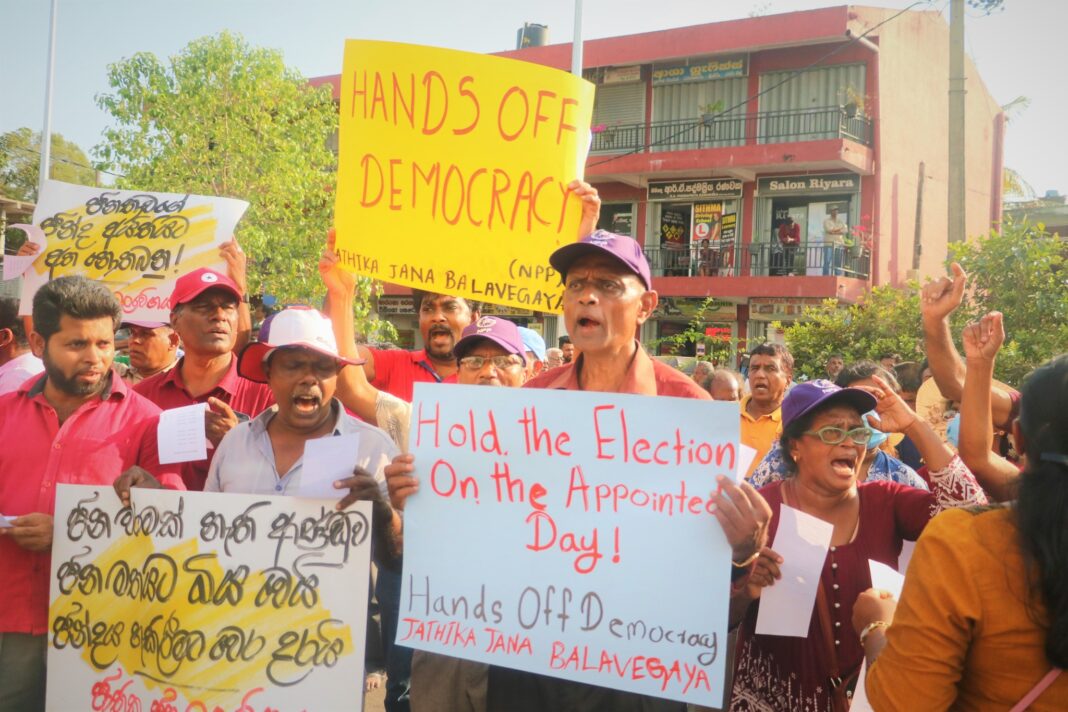With the National Elections Commission (NEC) announcing the postponement of the postal voting for the local government elections, it is likely that the entire elections may be postponed to a later date. Despite making every effort to hold the elections on the due date and even informing court that they were ready to do so, the NEC was compelled to take a step backwards and announce the postponement of the postal voting.
Pretexts by the Printer
The immediate cause for the postponement was the inability of the Government Printer to print postal papers on time. The reason given by the Government Printer for her inability to keep to the time schedule was the failure on the part of the Government to provide her the funds necessary for carrying out the task and the failure of the Police to ensure the security of the printing process by assigning sufficient Police personnel to guard the Government Printers Department.
It is to be noted that the local government elections scheduled for March 9 of this year, should have been held by March last year, but were postponed using the powers vested in the Local Government Minister. The legislature in its wisdom has only provided for one such postponement and the Minister has no power to postpone elections any longer.
Fear of losing
Clearly the various attempts to prevent the elections being held originate from the fear that the Government will fare badly at the polls if it is held as scheduled. However it is puzzling why the President is taking this stand as any outcome of thess elections cannot be taken as a verdict on his stewardship of the country in the past several months. While the Government’s actions under President Ranil Wickremesinghe, such as the attempts at stifling legitimate protests and the tax policies, will accrue to his account, the fact that the country has been pushed to bankruptcy is a damning indictment of the Gotabaya Rajapaksa Presidency and the Sri Lanka Podujana Peramuna (SLPP) Government.
The United National Party (UNP) could strategically have well avoided contesting the local government elections and allowed the SLPP to test the waters by facing the elections. Besides however much political parties dislike losing elections facing victory and defeat at the polls is part of the course in democracies. It is these defeats which if used wisely that serve as springboards for victories in the future. A case in point is the UNP’s defeat in 1970 and subsequent victory in 1977.
Franchise at regular elections
However the political fortunes of one party or the other cannot be subservient to the exercise of the franchise at regular elections which is the bedrock of democracy. In Sri Lanka in view of its cherished record as a vibrant democracy and the Constitutional provisions that exist tampering with the franchise is simply not on.
The current impasse with regard to the local government elections give rise to several Constitutional questions. Some of these may be the subject of intense political debates and even end up with judicial pronouncements with regard to the propriety of various actions of Government agencies. A few of such questions that arise are:
The individual liability
a. The Constitution provides that Parliament shall have full control over public finance. In the exercise of such power Parliament has allocated funds for election purposes in the last budget. The question arises whether a Government official can refrain from giving effect to the wishes of Parliament by denying the NEC of such funds which have the sanction of Parliament and what legal consequences will he face in respect of denial of such funds.
b. What is the individual liability of Government officials if their actions constitute interference with the electoral process.
c. All Government officials are committed to safeguard, protect and give effect to the Constitution. How will their actions impinge on these provisions.
d. How will the actions of Government officials impinge on the Directives of State Policy as well as the Fundamental Rights enshrined in
the Constitution.
The above are only a few of the legal implications that can arise in the event of a postponement of the local government elections.
Unfortunately Government officials are faced with a difficult predicament and may eventually have to be accountable for any actions they may take or fail to take with regard to the local government elections.
In the meantime the former NEC Chairman Mahinda Deshapriya has shed light with regard to the expenditure for an election. According to him 60 percent of expenses of an election occurred the day after the election took place, and therefore the NEC only needs three billion rupees at present to conduct the March 9 elections.
The Danger
This opens up the possibility of meeting the balance expenditure after the elections, with the Government announcing that the International Monetary Fund (IMF)’s assistance is expected next month.
As reported in the media, Mahinda Deshapriya has warned that postponing next month’s elections on the grounds of lack of funds would set a bad precedent for the future.
If the lack of funds is impeding the holding of elections as the Government claims there are many other options that it can pursue. One is to have recourse to the Contingencies Fund. The other is the suggestion made by former Parliamentarian Hirunika Premachandra to solicit funds from the private sector.
Private Sector
If the Government does not wish to pursue the option of obtaining funds from the private sector, election monitoring bodies can call for the private sector to pledge funds for this purpose.
In the past the private sector has generously loosened its purse strings and assisted the State in times of need, such as during the armed conflict for defence purposes, after the 2004 Tsunami and making contributions to the Fund to assist the Government to meet the challenges of the COVID-19 pandemic.
The private sector will surely not hesitate to assist the Government to fulfill a national need.
